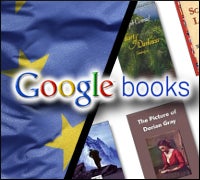 |
With Google’s controversial Book Search agreement under review this week in a series of meetings in Brussels, some European authorities have expressed cautious praise of the settlement.
EU Commissioners Viviane Reding and Charlie McCreevy marked the occasion by issuing a lengthy statement calling for an overhaul of European copyright laws to accommodate new digitization efforts such as Google’s (NASDAQ: GOOG), while ensuring that authors and publishers aren’t shortchanged in the process.
“Digitization of books is a task of Herculean proportions which the public sector needs to guide, but where it also needs private-sector support,” they said, noting that scanning efforts already in place have only brought 1 percent of the books in Europe’s national libraries online.
They said that the “challenge for EU policymakers is to ensure a regulatory framework which paves the way for a rapid roll-out of services, similar to those made possible in the United Sates by the recent settlement,” describing the need to digitize the content of Europe’s libraries efficiently and fairly as both a cultural and economic challenge.
The commissioners stressed the importance of updating and streamlining EU copyright laws, particularly with respect to out-of-print and orphan works, or books whose rights owners cannot be located. Those two issues have been among the most controversial in Google’s Book Search settlement.
The commission held an informational hearing on the settlement Monday, and Reding today had a series of meetings with Google and other stakeholders.
In the course of the proceedings, she said that Google had offered the assurance that “European authors will receive the same treatment and the same remuneration under the settlement as US authors.” Google pledged that it would not digitize in-print copyrighted works without the expressed consent of their European authors.
Following the meetings this week, Reding and McCreevy said they would issue a report to European Parliament. The European Commission, the EU’s executive body, has an open proceeding on the matter through Nov. 15.
Reding said today that she planned to work on legislation to address Europe’s digital copyright challenges in the coming months.
The settlement, reached last October to resolve a three-year-old class action suit brought by authors and publishers, is facing a more serious test in the United States.
A judge in a federal court in New York has scheduled a fairness hearing for Oct. 7 to consider the settlement.
Separately, the Justice Department has initiated its own review of the matter.
The U.S. District Court for New York’s Southern District had set Friday as a deadline for the public to submit comments on the settlement, which has come under intense criticism from a variety of groups.
One of the more public efforts appeared in the form of the Open Book Alliance, a group led by the Internet Archive, a nonprofit digital library that enlisted the support of tech heavyweights Microsoft (NASDAQ: MSFT), Yahoo (NASDAQ: YHOO) and Amazon (NASDAQ: AMZN).
The group alleges that Google’s settlement with authors and publishers would create a “monopoly” on digital books, giving the search giant license to create a “price-fixing cartel.”
Some watchdog groups, as well as the Federal Trade Commission, have raised concerns about the privacy implications of Google’s Book Search project, which Google attempted to counter with the promise of a dedicated privacy policy to protect people’s reading habits.
Most recently, a group of authors and publishers filed an objection to the settlement today, calling on the court to require Google to enact rigid privacy protections and to establish a mechanism for ongoing oversight. The group is represented by the rights groups Electronic Frontier Foundation, American Civil Liberties Union, and the Samuelson Clinic at University of California, Berkeley, School of Law.
Google has defended its project, claiming it will revive access to books that have fallen into obscurity, while reopening a source of revenue for authors in the form of advertising and sales. Under the settlement, Google agreed to pay rights owners 63 percent of the revenue it generated through the Book Search project.
Google is also offering access to millions of books to the visually impaired through new types of e-readers and Braille display technology.


